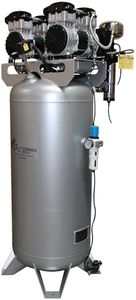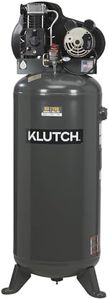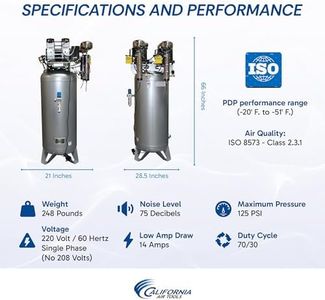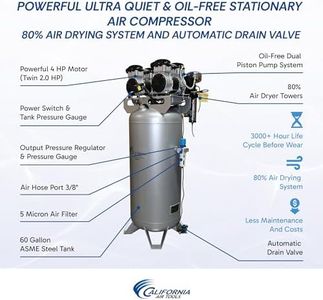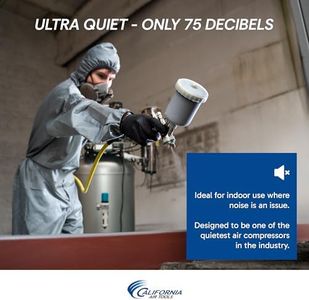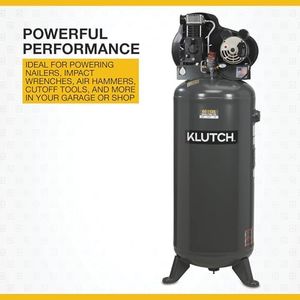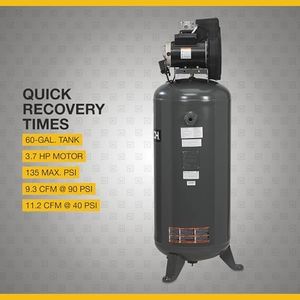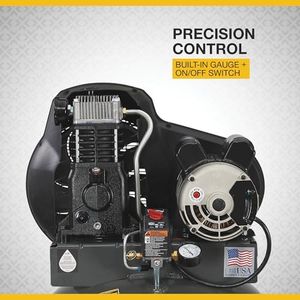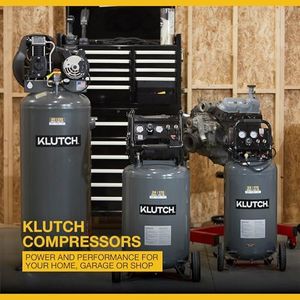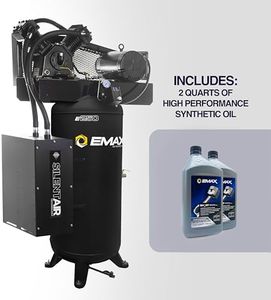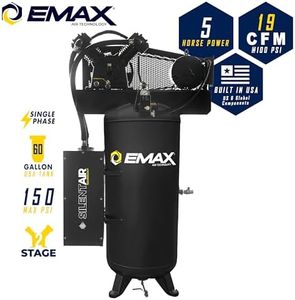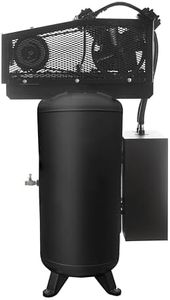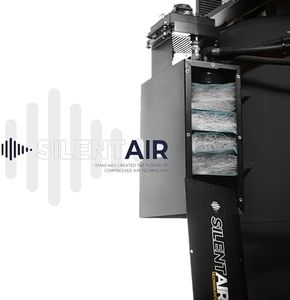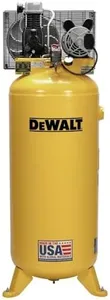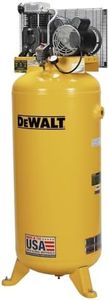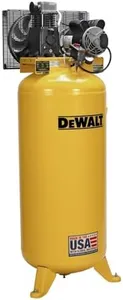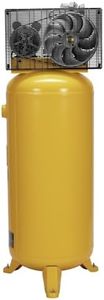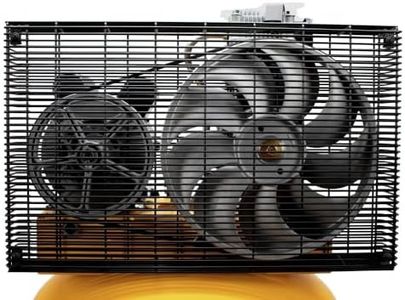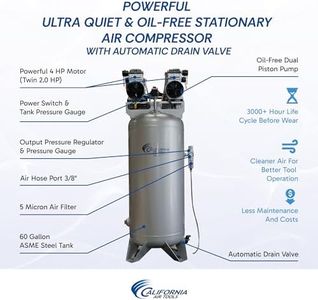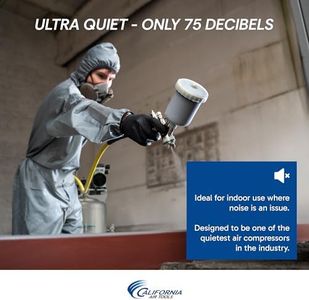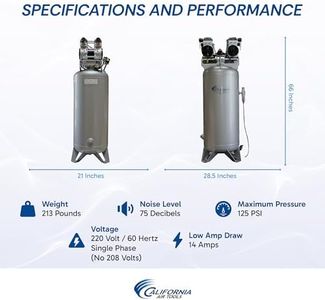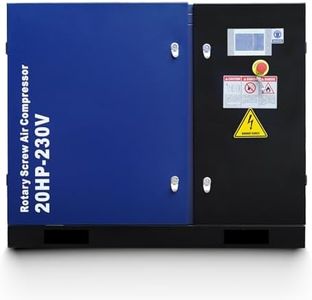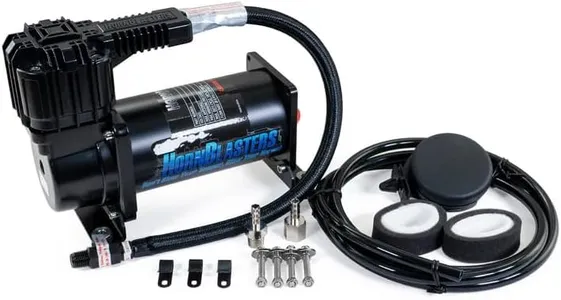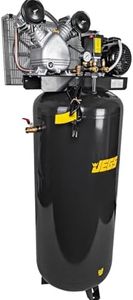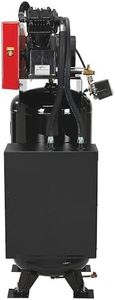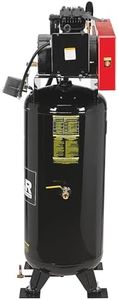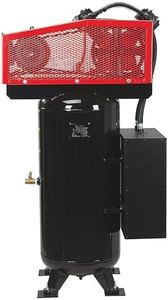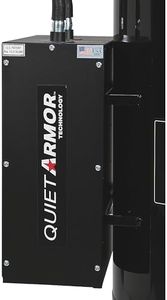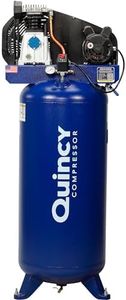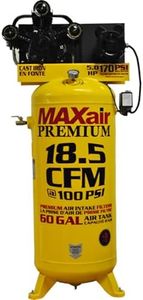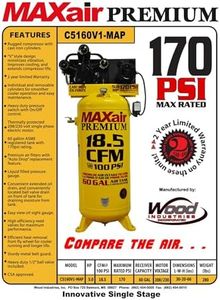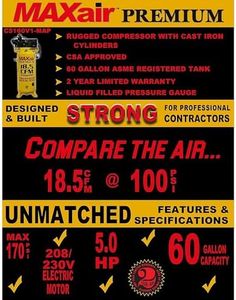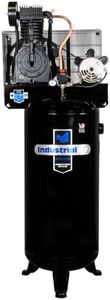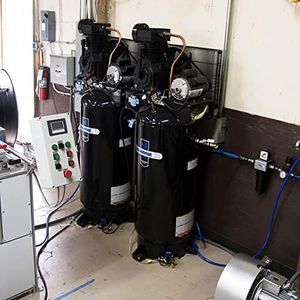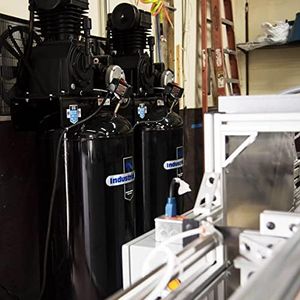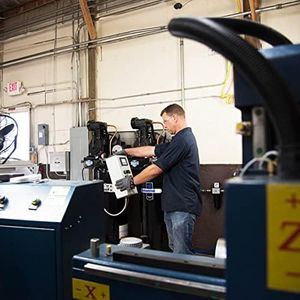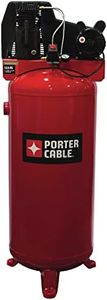10 Best 60 Gallon Air Compressors 2026 in the United States
Winner
California Air Tools 60040DCAD 4.0 HP Ultra Quiet and Oil-Free Air Compressor, 60 Gallon Steel Tank, 75 dBA Noise Level, with Air Drying System and Auto Drain
The California Air Tools 60040DCAD is a 60-gallon air compressor designed for users who need a quiet yet powerful machine, such as hobbyists or professionals working in noise-sensitive environments. It runs at a relatively low noise level of 75 decibels, which is significantly quieter than many compressors, making it suitable for indoor use or workshops where noise is a concern. The compressor features twin 2.0 HP motors that provide a total of 4.0 horsepower, supporting a strong airflow of 12.8 CFM at 40 PSI and 10.6 CFM at 90 PSI. This means it can handle tasks like airbrushing, cleaning, or tire inflation without struggling.
Most important from
74 reviews
Klutch 60-Gallon Single-Stage Vertical Air Compressor, 3.7 HP, 230 Volts
The Klutch 60-Gallon Single-Stage Vertical Air Compressor is a solid choice for those needing a mid-sized, powerful air compressor for home workshops or light commercial use. It features a strong 3.7 HP motor that delivers 9.3 CFM at 90 PSI, suitable for running a variety of pneumatic tools efficiently. The maximum pressure of 135 PSI offers enough power for most tasks in its class. The 60-gallon vertical tank allows for longer tool run times without frequent motor cycling, which is good for consistent work.
Most important from
450 reviews
EMAX Silent Air Industrial Air Compressor - 5HP 60 Gal 19CFM Single Stage Vertical Compressor with Splash Lubricated Pump, Isolator Pads & Oil for First Change - Made in the USA - ESS05V060V1
The EMAX Silent Air Industrial Air Compressor is a solid choice if you need a powerful, quiet, and reliable 60-gallon air compressor for industrial tasks. It delivers 19 cubic feet per minute (CFM) at 90 PSI, which is strong enough for various uses like drilling, sanding, or tire inflation. With a 5-horsepower motor and a maximum pressure of 150 PSI, it provides plenty of power for demanding jobs.
Most important from
3 reviews
Top 10 Best 60 Gallon Air Compressors 2026 in the United States
Winner
California Air Tools 60040DCAD 4.0 HP Ultra Quiet and Oil-Free Air Compressor, 60 Gallon Steel Tank, 75 dBA Noise Level, with Air Drying System and Auto Drain
California Air Tools 60040DCAD 4.0 HP Ultra Quiet and Oil-Free Air Compressor, 60 Gallon Steel Tank, 75 dBA Noise Level, with Air Drying System and Auto Drain
Chosen by 1163 this week
Klutch 60-Gallon Single-Stage Vertical Air Compressor, 3.7 HP, 230 Volts
Klutch 60-Gallon Single-Stage Vertical Air Compressor, 3.7 HP, 230 Volts
EMAX Silent Air Industrial Air Compressor - 5HP 60 Gal 19CFM Single Stage Vertical Compressor with Splash Lubricated Pump, Isolator Pads & Oil for First Change - Made in the USA - ESS05V060V1
EMAX Silent Air Industrial Air Compressor - 5HP 60 Gal 19CFM Single Stage Vertical Compressor with Splash Lubricated Pump, Isolator Pads & Oil for First Change - Made in the USA - ESS05V060V1
DEWALT 60 Gallon Vertical Air Compressor, Stationary, 3.7 HP, 175 Max PSI, Oil Lubricated, ASME Tank, Industrial-Grade Performance for Reliable Use in Workshop or Garage
DEWALT 60 Gallon Vertical Air Compressor, Stationary, 3.7 HP, 175 Max PSI, Oil Lubricated, ASME Tank, Industrial-Grade Performance for Reliable Use in Workshop or Garage
California Air Tools CAT-60040CAD 4.0 HP Ultra Quiet and Oil-Free Air Compressor, 60 Gallon Steel Tank, 75 dBA Noise Level
California Air Tools CAT-60040CAD 4.0 HP Ultra Quiet and Oil-Free Air Compressor, 60 Gallon Steel Tank, 75 dBA Noise Level
NorthStar Air Compressor with Quiet Armor, 60 Gal., 5 HP, 19 CFM @ 90 PSI, 150 Max. PSI, 230V, Single Phase
NorthStar Air Compressor with Quiet Armor, 60 Gal., 5 HP, 19 CFM @ 90 PSI, 150 Max. PSI, 230V, Single Phase
Quincy Electric Air Compressor 3.5Hp 60 Gallon Vertical
Quincy Electric Air Compressor 3.5Hp 60 Gallon Vertical
Maxair C5160V1-MAP 60-Gallon 170 PSI Max Electric Stationary Compressor
Maxair C5160V1-MAP 60-Gallon 170 PSI Max Electric Stationary Compressor
Industrial Air IV5076055 60 gallon 5 hp Two Stage Air Compressor
Industrial Air IV5076055 60 gallon 5 hp Two Stage Air Compressor
PORTER-CABLE - Porter-Cable PXCMLC3706056 3.7 HP 60 Gallon Oil-Lube Vertical Stationary Air Compressor
PORTER-CABLE - Porter-Cable PXCMLC3706056 3.7 HP 60 Gallon Oil-Lube Vertical Stationary Air Compressor
Our technology thoroughly searches through the online shopping world, reviewing hundreds of sites. We then process and analyze this information, updating in real-time to bring you the latest top-rated products. This way, you always get the best and most current options available.

